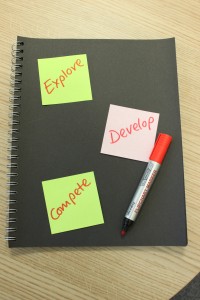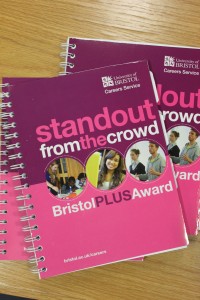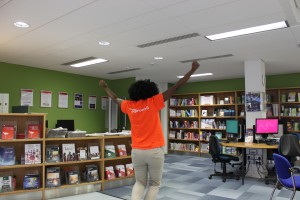The Careers Service’s new hashtag is #GetCareerReady. What does this mean? And how can we help you to Get Career Ready?
Explore – what’s right for you and what are the options?
What does a career mean to you? What job is right for you? Before you can answer these questions you need to know what will suit you. The Careers Service guide has some straightforward exercises to complete that will help you think about this. Look at this online or come in and pick up a copy at the Careers Service.

Exploring is also about understanding what jobs exist out there. Trying to understand the job market can be incredibly hard, there are 1000s of opportunities and unless you have a very clear idea of what you want to do, searching for companies and graduate roles can be daunting. We run regular talks on how to research organisations and industries, plus we have a number of sector guides on our website to get you started.
Develop yourself
Alongside exploring your options you need to be developing your own set of skills, understanding what makes you unique and learning how to manage yourself. Not much then! So how do you do all that?
The main thing you need to do is get involved in activity as part of your degree, as well as away from your studies. It’s important to be active, not passive, do not expect opportunities to come to you. The more you get involved in societies, volunteering, part time work, sports, initiatives within your school, research lectures and work shadowing, the more you will be developing skills and becoming the “all-rounder” that employers look for.
Jo Hutchings, the Information, Advice and Guidance Manager at the Careers Service says “in my experience the students who come into the Careers Service who have been proactive in getting involved whilst at university, generally have a more mature attitude, a confidence in the way they present themselves and the ability to take feedback and act on it. These are all qualities, that if I notice them in a short 15 minute appointment, an employer is certainly going to see at an interview or assessment centre stage!”
 The Bristol PLUS Award is designed to help all students develop skills at university, with opportunities to reflect on your experiences, to gain a better understanding of who you are and your strengths. This enables you to become more self aware, a quality all employers look for.
The Bristol PLUS Award is designed to help all students develop skills at university, with opportunities to reflect on your experiences, to gain a better understanding of who you are and your strengths. This enables you to become more self aware, a quality all employers look for.
Finally, competing for jobs/further study
So #GetCareerReady is about understanding what jobs are out there and what might suit you. Once you have started to establish this, you need to get applying to compete for opportunities.
And, it is a competition; you need to be prepared to work hard for the opportunities out there. Put time into your applications, research organisations, understand the roles you are applying for and get feedback before your final submission. The Careers Service is well equipped to give you this feedback and advice through our appointments. We also have a wide variety of ta lks to help you prepare for the application process. These are complemented by online advice and practical help with our interview simulator on mycareer and practice selection tests.
lks to help you prepare for the application process. These are complemented by online advice and practical help with our interview simulator on mycareer and practice selection tests.
So if you want to #GetCareerReady, come into the Careers Service to find out how we can help you, as one of our recent users said:
“The Careers Service is fantastic. Professional and comprehensive. I can’t flaw the incredible service”

